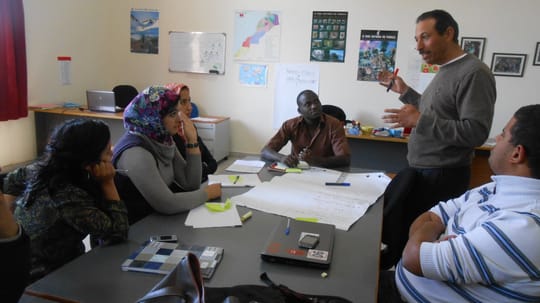Legal Aid Program in Mohammedia Benefiting Moroccans with Disabilities

Mouhssine Tadlaoui-Cherki
1 February, 2016
The High Atlas Foundation (HAF) team is currently in the process of wrapping up its Legal Aid Program, funded by the National Endowment for Democracy and held in partnership with the Faculty of Law, Economics and Social Sciences in Mohammedia.
The program concentrated on providing legal services for civil society organizations (CSOs) and marginalized communities and groups, particularly women and youth. Areas of the law focused upon included economic, political and social aspects that impact on the ability of CSOs and communities to engage in efficient advocacy efforts for policy reform so as to make a tangible, positive impact on citizens’ life conditions.
40 CSO activists and leaders from 6 communes in the province of Mohammedia participated in the program. Of these, 12 were themselves disabled and represented 3 CSOs dedicated to providing services to individuals with disabilities and special needs. All participants gained legal knowledge, analytical skills and a heightened capacity to plan and manage participatory advocacy strategies leading to legal and political reforms.
Direct beneficiaries also included 25 law students, 4 of them with disabilities. They were able to build their applied skills through providing legal counseling for the other participants and by extension, for the CSOs and communes they represented.
One component of the program was a needs assessment conducted together with the participants to help design community development plans. As a result, two projects were created to benefit directly people with disabilities.
The first was an advocacy strategy to ensure equal access for people with disabilities to government buildings in Mohammedia. CSO activists were able to meet with the Governor and representatives of newly elected communal councils and convince them to activate and enforce all existing regulations and policies regarding disability and accessibility. By the end of December 2015, CSO activists were able to report that the infrastructure necessary to ensure equal access had been installed in six government premises in the province.
Mme. Fatima Jawad, who has a physical disability and who is the president of the association ‘All Together to Develop and Support People with Special Needs’ commented “being able to bring together activists from different CSOs to lead the process of developing and implementing an efficient advocacy strategy to address the issue of accessibility to government buildings by people with disabilities and the positive reaction of the Governor and local authorities – all of these are positive indicators that, with support and guidance we, individuals with physical disabilities, are able to be independent at all levels”.
The aim of the second project was to create a vocational training structure for teenagers with Down syndrome. The HAF team helped secure funding for a year-long training for 6 teenagers currently preparing for their diploma to become chefs. It is hoped that, on qualifying, they will be able to be integrated into the job market.
M. Tarik Zaboud, the general secretary of Association ‘Parents and Friends of Children with Down Syndrome in Mohammedia’ commented: “partners, both public and private, were hesitant to work with our association. Now that we were able to restructure our operations thanks to training and guidance provided by the High Atlas Foundation, we were able to expand an existing partnership with the Ministry of National Education and sign a new agreement with the National Welfare Department. These agreements allowed us to provide education and professional training to over 50 children and youth with Down syndrome.”